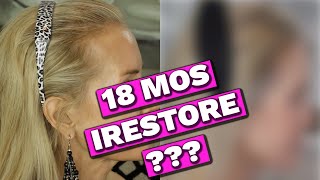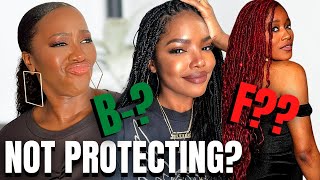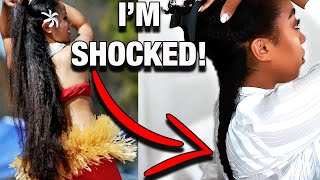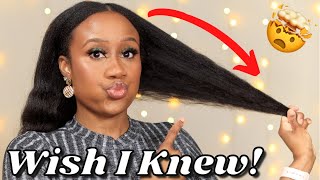What are the Best Foods for Hair Growth and Thickness?
- Posted on 27 November, 2018
- Hot Topic
- By Kenneth
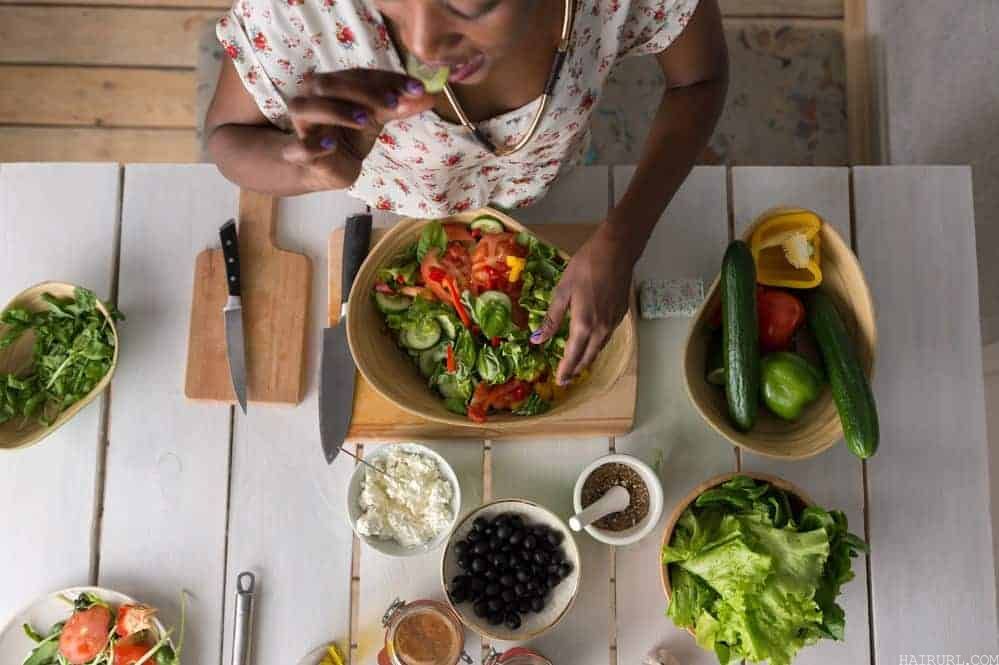 This young African American female is making a salad, which can be a great vegetarian food option for promoting healthy hair growth.
This young African American female is making a salad, which can be a great vegetarian food option for promoting healthy hair growth.Kira and I are commonly asked about the best foods for promoting healthy hair growth. We often respond to this question in a very similar manner.
Following a healthy diet is something that is good for your hair, but it is also good for your overall health and wellbeing.
While we’re interested in helping women promote hair growth, it’s not just about eating better to get your hair to grow faster (or longer and fuller), but also about making dietary changes that will help you see all kinds of improvements, such as weight loss, more energy, and even clearer skin.
The truth is that the diets we follow can have an impact on our hair. It can change the way our curl patterns look, cause hair to grow thicker, keep our hair from drying out, and mitigate breakage.
We believe that following a healthy nutritional plan that includes lean meats (if you’re not vegetarian) fruits and vegetables will provide nutrients that you need for hair health.
The goal is to create a healthy diet that’s rich in essential fatty acids, vitamins, beta-carotene, and other essential nutrients to become a much healthier person. This is one of the key building blocks to creating a healthy natural hair regimen.
The Basics: How to Improve Hair Growth with Food
There are certain things that you should understand when you are making dietary changes to become healthier and improve your hair growth.
These things include:
Disclaimer: We are not licensed medical professionals and cannot assess your specific dietary needs. The information provided below should not be implemented without consulting a medical professional that understands your specific medical and dietary needs.
Not everyone has the same nutritional needs – each person is unique. If you want to become healthier, you must make healthy choices. The best way to get the nutrients that your body needs is to eat whole foods.
You should consume raw foods on regular basis. You cannot expect to see results from dietary supplements alone. Dietary supplements can promote good health when they are taken while a person is making essential dietary changes.
If you start managing your nutritional intake, the condition of your hair and skin will likely improve. The goal of this article is to help you create a strategy that will lead to increased hair growth and thickness.
Your hair and skin are often clues about what’s happening inside your body.
The cells that make up your hair grow very rapidly. You must receive proper nourishment in the form of healthy, natural foods in order to support this rapid hair growth.
So, it’s important to understand that your hair can be impacted as your body changes over time. For example, a lack of sleep, pregnancy, a poor diet, and excess amounts of stress are examples of things that can negatively impact your hair.
Our bodies determine how to use the nutrients that we consume. So, if you’re not eating a healthy diet, your body will prioritize key nutrients for body functions required to survive.
This means that if your body needs additional nutrients, your hair (skin, nails, etc.) will suffer unless you improve your diet.
What Kind of Food Should You Eat for Hair Growth?
Let’s incorporate more hair growth foods into your natural hair regimen. There are several great hair foods that you can add to your diet. Below is a list of my favorite recommendations (includes vegetarian foods for hair growth too):
1. Meats
Meats, like steak and chicken, are common foods in many people’s diets. Meats are a good source of various nutrients (like protein) that can support hair growth.
Protein is an essential nutritional element in meat, and it helps repair damaged hair follicles. Eating around 100 grams of red meat supplies your body with about 29 grams of protein.
Iron is yet another nutrient found in red meat and is quickly absorbed into the body. Iron is essential for the delivery of oxygen to the hair follicles and other cells within the body (source). Iron and protein deficiencies have been correlated with hair loss.
2. Oysters
Adding oysters to your diet will significantly increase the amount of zinc you consume. Zinc is an essential mineral that the body needs for various functions including hair growth.
Zinc deficiency triggers telogen effluvium a kind of hair loss that is common but reversible (source). Research shows that increasing your zinc intake via options such as taking zinc supplements can help reverse the hair loss attributed to zinc deficiency.
However, consumption of the zinc supplement should be regulated because too much zinc can just as well trigger the thinning of hair. As such, it is better to consider getting this essential mineral in minimal amounts from foods such as oysters as opposed to supplements.
I’m not a fan of oysters, so if you don’t care much for seafood you still have options. You can also add some nuts to your eating plan if you’re looking for an excellent source of zinc. Brazil nuts, walnuts, almonds, and cashews are a few good options.
3. Seeds
Eating seeds is an ideal way of getting the nutrients you need with a low caloric intake. Some of the nutrients found in seeds include selenium, zinc, and vitamin E which support hair health.
A daily intake of around 28 grams of sunflower seeds will supply the body with half the amount of vitamin E it needs as well as a substantial amount of vitamin B.
Moreover, seeds such as chia seeds and flaxseeds can be a source of plant-based omega-3 fatty acids. Eating an ounce of these seeds supplies the body with about 6,388 milligrams of fatty acids, which is more than what you can get from half a fillet of salmon (about 178 grams).
However, the omega-3 fatty acids from the seeds are not as effective as those found in the fatty fish but are still an excellent addition to your diet for purposes of promoting hair growth and overall health.
Your diet should contain a mix of different seeds for you to get the widest variety of nutrients. Flaxseeds go great in breakfast smoothies.
4. Shrimp
Shrimp is a type of shellfish that is rich in various nutrients such as vitamins B, vitamin D, iron, and zinc which are known to support hair growth and health.
Eating around 100 grams of shrimp a day will deliver 38% of the amount of Vitamin D the body needs daily. Interestingly, a vitamin D3 deficiency has been found to trigger hair loss.
And while shrimp may have a low-fat content, the small amount of omega-3 fatty acids it has is abundant, and that means that eating shrimp can help improve the growth and health of your hair.
Shrimp is an excellent source of vitamin D, vitamin B, zinc, iron, and protein as well as a small amount of omega-3 fatty acids, all of which have been found to play an essential role in hair growth.
5. Fatty Fish
Fatty fish is a great source of nutrients that can improve hair health. The list of such fish will include mackerel, salmon, and herring; they are all good sources of omega-3 fatty acids that have been linked with improved hair health.
A study was conducted on 120 women that used supplements containing antioxidants, omega-3, and omega-6 fatty acids show that these nutrients improved hair dentistry and reduced hair loss (source).
In a different research, consumption of fish oil supplements was found to reduce hair loss significantly while improving hair growth in ladies with hair loss (source).
However, there is little supportive evidence that shows any significant associations between fatty acids and hair health and growth.
Besides the nutrients mentioned, fatty fish is an excellent source of other nutrients such as vitamins B and D4, protein, and selenium which have been found to aid in improving hair health.
6. Eggs
Biotin and protein are two nutrients that play a vital role in promoting hair growth, and eggs are a rich source of these two nutrients.
Hair follicles are made of protein and thus consuming foods rich in protein is essential for hair growth. Subsequently, protein deficiency has been linked to hair loss.
On the other hand, biotin aids in the production of keratin, a hair protein. That is why there are biotin supplements marketed as products that promote hair growth.
As such, adequate biotin has been found to help support hair growth, although the body produces biotin naturally.
Biotin deficiencies are rare for people that eat a balanced diet, and there is little evidence that proves such individuals can benefit from increasing their biotin intake.
Eggs also contain other nutrients such as selenium and zinc that promote hair health, and this means that eggs are among the best foods to consume if you want to have strong, healthy hair.
Eggs Benedict, frittatas, and omelets are all classic egg dishes that provide a good source of protein. So add some eggs to your meal plan.
Do you remember those muscular guys who drank raw eggs on television years ago? Are you willing to go that far?
7. Beans
Beans are an ideal source of plant-based protein, and this nutrient is linked with hair growth and health.
Beans are also a source of zinc. Eating around 100 grams of black beans will supply your body with nearly 7% of the zinc it needs per day.
Beans can also be an ideal source of other nutrients such as folate, iron, and biotin.
And since, beans are relatively cheap and readily available, they are among the most straightforward answers to the hair loss and related problems you may be facing.
Who likes Chili? What about pinto beans or kidney beans?
8. Avocados
Avocados are a healthy source of natural, healthy fats and vitamin E which support and improve hair health.
Consuming around 200 grams of avocado, which is equivalent to eating a medium-sized avocado, supplies you with 21% of the vitamin E needed for the day.
Vitamin E has antioxidant properties that aid in fighting the effects of free radicals in the body more so around the skin. The damage to the skin caused by the free radical can contribute to thinning hair and weak hair (source), leading to increased breakage (source).
Research shows that consistent intake of vitamin E supplements for eight consecutive months increased the hair growth rate by nearly 35% (source).
Furthermore, avocados contain essential fatty acids that the body cannot synthesize. The fatty acids are vital building blocks for the body cells, and a deficiency of these fatty acids has been associated with poor hair health.
9. Soybeans
Soybeans have compounds, such as spermidine, that have been found to support and promote healthy hair.
Research done on 100 healthy individuals who were on a spermidine-based nutritional supplement showed that such an addition to their diet prolonged the activity of hair growth (a phase known as anagen). In essence, a hair follicle is bound to grow longer, the longer it stays in the anagen phase (source).
Such findings are further supported by various test-tube studies on how spermidine promotes hair growth (source).
And while the spermidine studies are relatively new, more and more research is required to substantiate the findings and give irrefutable recommendations on the effects of spermidine regarding the promotion of hair growth and health.
10. Nuts
Nuts are a delightful treat and a source of various nutrients that support hair health and growth.
Eating about an ounce of almonds can supply the body with 37% of the vitamin E it needs per day. Nuts are also an excellent source of a variety of vitamin B, essential fatty acids, and zinc; a deficiency of these nutrients has been associated with issues of weak hair and hair loss (source).
Besides hair growth, the nutrients in nuts have been linked with other health benefits such as lowering the risk of heart disease and reducing inflammation.
11. Sweet Peppers
Adding sweet pepper to your diet can ensure that your body gets the vitamin A and C it needs.
When you eat one yellow pepper, you will get nearly 5.5 times the amount of vitamin C you get from an orange. Vitamin C supports the production of collagen that promotes the growth of thick, healthy hair strands.
Vitamin C is also an excellent antioxidant that aids in protecting the follicles from the effects of free radicals that cause graying and thinning of hair (source).
On the other hand, vitamin A helps to increase the hair growth rate while supporting sebum production that promotes hair health (source).
12. Spinach
Remember the cartoon Popeye the Sailor Man? Popeye would pop open a can of spinach to recharge his superhuman strength anytime his girlfriend Olive Oyl was in trouble.
You probably know where I’m going by now, but you should incorporate several dark green veggies, like broccoli and spinach into your diet. These veggies are packed with nutrients like vitamins A and C.
Spinach is loaded with folate, vitamins A and C, iron, as well as other nutrients and minerals that promote hair growth and health.
Vitamin A aids in the production of sebum, which is an oily substance that serves as a natural moisturizer for the scalp thus helping to keep the hair healthy and vibrant (source).
Consuming around 30grams of this leafy green vegetable supplies the body with up to 54% of the vitamin A it needs per day.
It is one of the excellent sources of iron, a mineral that’s essential for hair health. The red blood cells need iron to help in the delivery of oxygen to all the organs in the body for the execution of other functions such as metabolism, cell repair, and hair growth (source).
Studies on iron deficiency have shown that it can lead to hair loss (source).
13. Sweet Potatoes
You can get beta-carotene from consuming sweet potatoes. The body converts the beta-carotene into Vitamin A for the promotion and growth of good, healthy, hair.
Eating around 114 grams of sweet potato, which is equivalent to medium sweet potato, supplies you with beta-carotene, which is four times the amount of vitamin A needed per day.
Vitamin A has been found to promote sebum production and this, in turn, supports the development of strong, healthy hair.
Moreover, vitamin A can increase the rate of hair growth while promoting the development of thick and healthy hair and preventing the regression of hair follicles (source).
14. Berries
Berries can be a source of vitamins and various beneficial elements that promote hair health.
One of the essential vitamins found in berries is vitamin C which is known to serve as a potent antioxidant.
Antioxidants play a significant role in promoting overall health. They shield the hair follicles from harmful free radicals that occur naturally in the body and are also in our surrounding environment.
Consuming around 144grams of strawberries (about a cup) will supply your body with 141% of the vitamin C it needs per day.
Vitamin C is essential for the production of collagen in the body. Collagen is a protein that can improve hair strength thus preventing it from being weak and breaking (source).
Moreover, the body needs vitamin C to aid with the absorption of iron. Iron deficiency can lead to anemia, a condition that can trigger hair loss.
So, Does Diet Affect Hair Growth?
Yes, it is evident that what you eat has a significant impact on your hair’s health.
You can use the information outlined in this article to create a meal plan that meets your overall nutritional needs.
So, what are the best foods for hair growth and thickness?
What’s up Doc? That’s the famous line of our carrot-eating friend – Bugs Bunny.
Aren’t you envious of Bugs Bunny’s natural hair?
It was most likely so healthy looking due to his consumption of carrots, which provide an excellent source of vitamin A and promote a healthy scalp.
Also, I really like Multi-grain Cheerios and fat-free milk. This healthy breakfast provides a good source of calcium, fiber, iron, and protein.
Consuming dairy products that are low fat like skim milk, cottage cheese and yogurt are an important component of your healthy hair journey.
Furthermore, incorporating whole-grain breakfast cereals and bread into your diet can provide you with zinc, iron, and vitamin B.
Ultimately you need to consume protein, and foods rich in vitamin A, D, C, E, and B Vitamins as well as minerals such as iron, zinc, folic acid, selenium, folate, biotin, and essential fatty acids that support the growth of healthy, strong follicles and minimize hair loss.
Correcting a deficiency in any of the nutrients can aid in addressing hair loss issues and increasing the rate of hair growth.
Related Articles
- Does Exercise Help Hair Growth?
- Benefits of Moringa for Hair Growth
- Best Hair Growth Products for African American Hair
- How To Use Triphala for Hair Growth
If you want your hair to reach its full potential, you’ll need more than quality hair products and a consistent natural hair regimen. You should also eat a healthy diet.
This article should get you started down the right path as you begin to create your meal plan. Now it’s time to take action, so head to your local grocery store and pick up your favorite foods that promote healthy hair growth.

